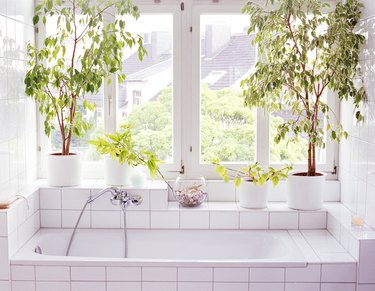By design, the average bathroom is a pretty sterile place when left to its own devices: Lots of hard, shiny surfaces, and a generally cool aesthetic. Adding plants to the mix softens the vibe and adds beauty to even the smallest and most generic bathrooms, but the bathroom provides a few challenges. Most have limited and variable light, and the level of humidity can be high as well. There are lots of plants that can cope with those conditions, and here are 10 of our favorites. Note that some of them may be toxic to pets or small children, a factor to consider in some homes.
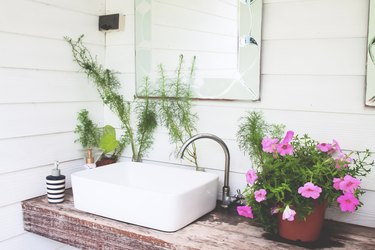
Video of the Day
1. Tillandsia, or "Air Plants"
If you could ask your fairy godmother for a perfect bathroom plant, what would it be like? Something small enough to fit anywhere? Something that could be mounted onto a wall or planted in a champagne cork? Something that requires next to no maintenance, but still gives a bold, tropical appearance? Well, congratulations. Those already exist, and there are hundreds of them. They're called tillandsia, or air plants. They'll take most of the moisture they need during your daily showers, though you may have to mist them occasionally if your vent van is really, really good. They like bright but indirect light, so as long as you keep them out of sunbeams and cold drafts, they'll flourish.
Video of the Day
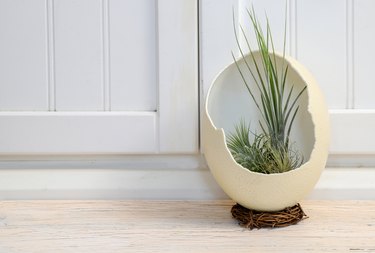
2. Sanseveria, the "Snake Plant"
Sansevieria, also known as the "snake plant," is a bold choice for bathrooms where you have a little more space and want a strong vertical element. Some varieties can grow as much as 8 feet tall, which fortuitously is exactly the height of the average ceiling. Their long, glossy leaves are green, with mottled patterns and sometimes a vivid yellow-green border. They favor a quick-draining soil and thrive on neglect. Don't water them until their soil is quite dry, because they're prone to rot. They'll only require occasional watering, especially in a humid bathroom. They like indirect light, and don't require much of it.
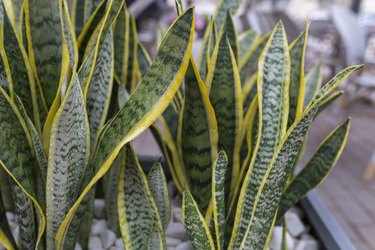
3. Ferns, a Near-Perfect Bathroom Plant
Ferns are a huge family of plants, ranging from tiny toothbrush-sized specimens to massively architectural plants that can dominate a whole corner of your room. With so many ferns to choose from, it's important to do your research. They vary in their love of moisture — there are some you can literally keep in the shower! — and their tolerance of sunlight. Pay attention to their growth potential, too, lest the fern you fall in love with outgrow its space and need to be rehomed.
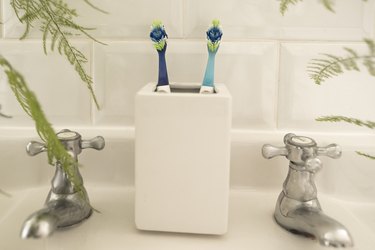
4. Medicinal Aloe Vera
A lot of the plants that flourish in a bathroom require minimal or indirect light, but what if you have a beautifully sunny spot to use? Aloe vera might jut be your best bet. It loves the sun, its fleshy leaves have a striking appearance, and because it's happy being rootbound you can get quite a large aloe in a surprisingly small pot. As a bonus, the gel found in the leaves is a well-known skin tonic. Plant your aloe in a light soil with excellent drainage, and only water it when the soil is completely dry. Typically, every couple of weeks is fine. If the leaves go limp or start to develop brown edges, that means you're giving it too much water and you'll need to ease off.
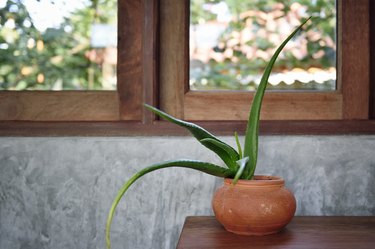
5. Calathea, the "Zebra Plant" or "Peacock Plant"
Calathea plants are usually considered difficult to grow, but are ideal candidates for the bathroom, where they'll find that "tropical rain forest" vibe to thrive. They provide beautifully patterned foliage, which is why the different species in this family have names like "zebra plant," "rattlesnake plant," or "peacock plant." They like lots of moisture but not wet feet, so give them a soil with good drainage but lots of vermiculite to retain water. Different varieties of calathea vary in the light they require or will tolerate, so take a careful look at the lighting situation in your bathroom before choosing one. Also, they're super-sensitive to cold drafts so don't put them near a window that opens.
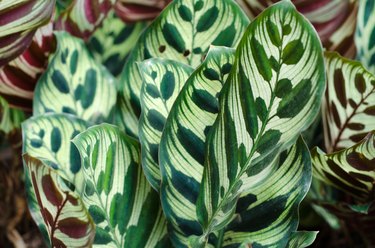
6. Spider Plants, an Easy Option
If your bathroom decor wouldn't be complete without a few hanging or trailing plants, the always-popular spider plant is a strong option. Not only is it happy with high humidity and low-to-medium light, the trademark "spiders" can be potted up to spread greenery throughout your house. Spider plants actually prefer being a bit rootbound, which is an added bonus in a modestly-sized bathroom. You can keep a surprisingly large spider plant in a small pot, which helps maximize your use of space.
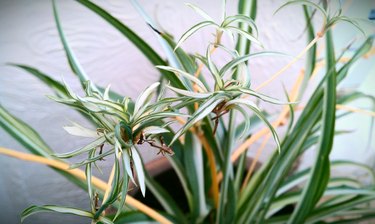
7. Gardenia (Cape Jasmine)
Most plants that flourish in your bathroom are favored for their foliage, but gardenias — sometimes also called "Cape — will also give you beautiful, fragrant blossoms. Like calathea, they're a notoriously finicky plant to grow and won't flourish in every bathroom, but if yours provides suitably warm and humid conditions, they're gloriously rewarding. Gardenias like a continuously moist, slightly acidic soil (rhododendron mix works well), so water them lightly but regularly. They like plenty of indirect sunlight, and hate a cold draft, so be careful when placing them near a window.
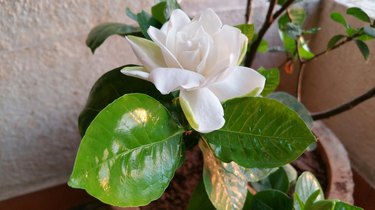
8. Aspidistra, the "Cast Iron Plant"
Aspidistra is an appealing tropical that grows 2 to 3 feet tall, ideal size to bridge the gap between small plants and larger, tree-like bathroom plants. It's so tolerant of neglect and mediocre gardening skills that one of its nicknames is "the cast iron plant," for its indestructibility. It favors well-drained soil and doesn't need much watering. In fact, it's okay with less humidity in general than most bathroom plants. Dark-green varieties tolerate nearly-full shade, but variegated varieties need a little more light.
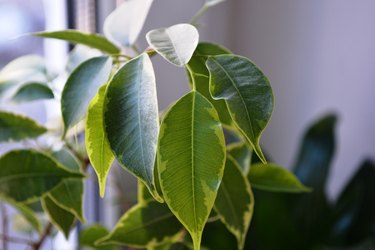
9. Dieffenbachia, or "Dumb Cane"
Big-leafed Dieffenbachia is another humidity-loving tropical plant that works well in bathrooms. Its striking leaves are variegated in glossy greens and pale yellows, with the patterns varying between cultivars. Dwarf varieties will top out at about 2 feet tall, but full-sized Dieffenbachia can reach 4 or 5 feet in height. You have lots of flexibility in placing your plant, because Dieffenbachia will tolerate a wide range of lighting conditions from bright (indirect) light to nearly-full shade. Too much sun will fade its colors, or in extreme cases scorch its leaves.
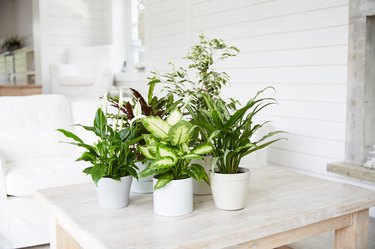
10. Ficus Benjamina, or "Weeping Fig"
If your bathroom has the space for it, sometimes an actual tree can be a welcome accent. One of your best options is Ficus benjamina, or "weeping fig." Its height makes it an appealing vertical option, and its glossy leaves — plain or variegated, depending on the cultivar — are beautiful in their own right. The tree isn't overly bushy, so it's a great option for providing shade and dappled light to other bathroom plants. Ficus benjamina doesn't like wet feet, so give it a soil with lots of drainage and only water it when the top couple of inches are dry. They like humidity and plenty of bright, indirect light, but hate cold drafts.
